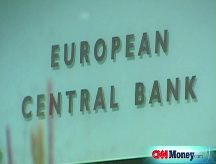Europe must keep hacking rates
Steep cuts were announced by three prominent European central banks Thursday morning, and experts said that this is just the beginning.


 |
| The dollar lost ground to the euro for years but has bounced back sharply recently. The greenback could strengthen further as European banks cut interest rates. |
NEW YORK (CNNMoney.com) -- Several European banks slashed interest rates Thursday morning. But that should not be the end of it.
Some market observers said that Europe needs to cut rates even more in order to have any meaningful positive impact.
The Bank of England is off to a good start. Its rate cut was expected, but the magnitude of the rate cut was a shocker: the BOE lowered rates by a full 1.5 percentage points to 3%.
The European Central Bank also lowered rates following a regularly scheduled meeting, but its cut was just a half-percentage point to 3.25%, in line with what most economists were forecasting.
Finally, the Swiss National Bank also joined the rate cut party, lowering rates by a half-percentage point to 2.75% in a surprise move.
Still, interest rates in Europe remain substantially higher than the federal funds rate of 1%. The disparity implies that the British, Swiss and the rest of continental Europe shouldn't put down the interest rate ax just yet.
"The spread between U.S. short-term banking rates and European lending rates is still historically wide. In order to provide truly aggressive action, Europe has plenty of room to cut rates and they will do so out of necessity," said Walter Gerasimowicz, chief investment officer of Meditron Asset Management, a New York-based global investment firm with about $1.1 billion in assets.
Gerasimowicz added that Thursday's actions prove that Europe's central bankers realize they must do whatever it takes to get credit flowing more freely again.
"This is a very, very poignant recognition of the fact that we still have financial uncertainty and a crisis globally. Coordinated action is absolutely necessary," Gerasimowicz said.
So how low should Europe go?
Daniel Alpert, managing director with Westwood Capital, an investment bank in New York, said that moves to eventually bring European rates in line with those in the United States are not completely out of the question since the credit crisis has clearly spread across the Atlantic.
"I don't understand the economic rationale for why Europe's interest rates shouldn't be in rough parity with the Fed. It's important that all the central banks get real," he said.
The Federal Reserve lowered rates to 1% on Oct. 29. And according to widely-watched federal funds futures on the Chicago Board of Trade, investors are pricing in another half-point cut to 0.5% at the Fed's next meeting on Dec. 16.
So Europe will probably need to keep lowering rates again before year's end just to keep pace with the U.S.
One fund manager said it is critical for central banks around the world to continue working together to lower rates since it is still unclear if the cuts already announced will be enough to restore a sense of normalcy to the credit markets.
"I guess we will all end up at 1% in the end," said Madelynn Matlock, manager of the Huntington International Equity fund. "The ECB, BOE and the Fed have to be in the business of pumping liquidity into the market to replace what was lost in the credit crisis. They may overshoot but let them."
And Alpert said that European banks can afford to drastically reduce rates since inflation is no longer a concern now that oil prices have plummeted nearly 60% since hitting a record high in mid-July.
"Many of the bankers at the ECB and Bank of England were sitting there, diddling around and worrying about inflation. But wiser minds have taken over. They were just so far behind the curve," Alpert said.
Still, Alpert said it was encouraging that Europe has seemingly abandoned its single-minded focus on inflation.
Thursday's rate cuts helped to further strengthen the dollar against the euro, which should lead to even more declines in the price of oil and other commodities which are pegged to the dollar. The greenback has now gained 20% against the euro since mid-July.
Gerasimowicz agreed that the dollar's bounce should end any lingering concerns about inflation being a threat. He even suggested there's a chance that deflation, a prolonged period of lower prices, could become a global problem in the future.
Nonetheless, Gerasimowicz expressed confidence that the United States should be able to emerge from this global downturn more quickly than Europe since it is clear that Europe is still playing catch up.
"All this taken together is a good sign and continues to show almost what is like the FIFO system in accounting. The U.S. was the first one into economic trouble and probably will be the first one out since we have already cut rates dramatically," he said.
Did you vote for Obama? How do you think the new president will affect your wallet? What do you think Obama needs to do to fix the economy - both in the short run and the long term? What should be first on the new Congress's agenda? E-mail us your thoughts, including your name, photo and contact info; the best answers will be featured in an upcoming CNNMoney.com article. ![]()


